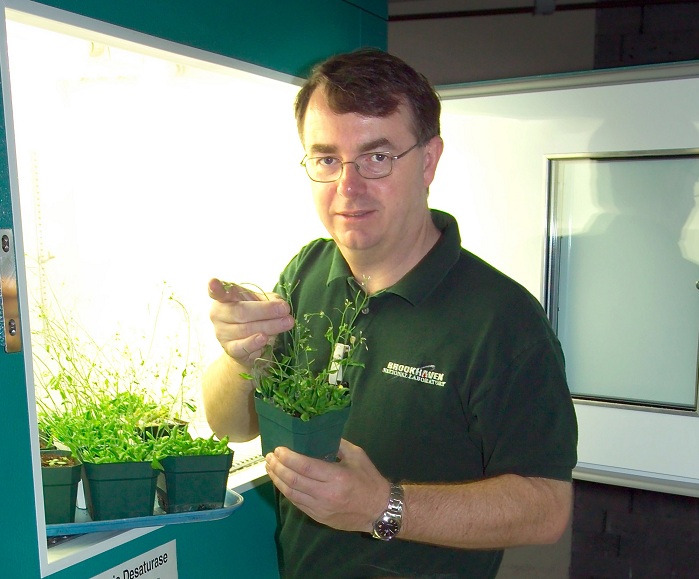In theory, plants could be completely "green" factories, engineered to create raw materials that today come from petroleum-based chemicals

In theory, plants could be completely "green" factories, engineered to create raw materials that today come from petroleum-based chemicals. But in practice, the ability to make plants produce high concentrations of the desired products has been an elusive challenge for scientists. Now, scientists from the US Department of Energy report a genetically engineered plant that produces high concentrations of compounds that can be used in the production of plastics. The study is published online in the scientific journal Plant Physiology.
"We were able to engineer a new metabolic pathway in plants to produce a type of fatty acid that can be used as a source of starting materials for chemical building blocks for the preparation of plastics such as polyethylene," said biochemist John Shanklin, the scientist who led the research. "The raw materials for most of the reagents used in the plastics industry today come from petroleum or coal-based synthetic materials. Our new way of obtaining raw materials derived from fatty acids found in plant seeds will be infinitely renewable and sustainable. Although additional technology is still required to efficiently convert the plant fatty acids into the necessary chemical building blocks, our research presents proof that high levels of sought-after raw materials can be produced within plants."
The method is based on the researcher's long-standing interest in fatty acids - the building blocks of vegetable oils - responsible for their production. The discovery of the genes coding for the enzymes responsible for the "unnatural" production of vegetable oil encouraged many researchers to find ways to express these genes and produce the desired oils in a variety of plants.
"There are plants that naturally produce the desired fatty acids called "omega-7 fatty acids" in their seeds - for example the plants cat's claw vine and milkweed - but their yield and growth characteristics are not suitable for commercial production," he explains the researcher Previous attempts to express the desired genes in more suitable plant varieties led to obtaining much lower concentrations of the desired oils than the concentrations found in the plants from which the genes were isolated. "This implies that further changes in the metabolic pathway are necessary in order to increase the production of the sought-after plant seed oils," the researcher noted.
"In order to overcome the problem of low yield, we performed a series of systematic metabolic induction experiments to increase the production of omega-7 fatty acids in transgenic plants," explains the researcher. In order to prove these principle experiments, the scientists worked with a plant of the Arabidopsis variety, a common plant used in research laboratories.
Enzymes responsible for the production of these unnatural fatty acids are slightly different versions of enzymes called "desaturases", which remove specific hydrogen atoms from the fatty acid chains to form carbon-carbon double bonds, so that they "anti-saturate" the fatty acid.
First, the researchers identified slightly different, natural versions of these enzymes with desired properties, but they performed poorly when introduced into the test plant. In the next step, they engineered a synthetic version of the enzyme that worked faster and with higher selectivity than the natural enzymes, which resulted in an increase in yield from two percent up to fourteen percent.
Although the achievement is an improvement, this level of output was still insufficient for industrial-scale production. The scientists subsequently made several additional changes in the metabolic pathways of the plants. For example, they will down-regulate genes that compete with the "food" of the enzymes that produce the desired fatty acids. After testing several traits separately, the researchers then combined the most promising traits into a single new plant.
The most efficient transgenic strain produced omega-7 fatty acid at a yield of 71 percent. The growth and development of the new transgenic strain was not affected by the genetic changes introduced into it and the increased production of the omega-7 fatty acid.
This general approach - identifying and expressing natural or synthetic enzymes, determining the effect of improvements resulting from additional genetic/metabolic changes, and combining the best properties - may also be useful for improving the production of a wide variety of unnatural fatty acids in other plant seeds.

One response
Assuming that the introduction of plants will not cause substantial changes to the environment, there is still a barrier of areas for cultivation and water for irrigation.